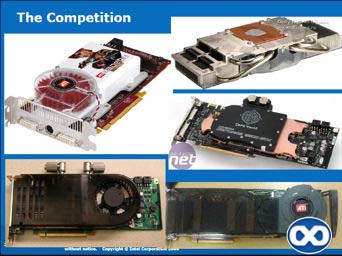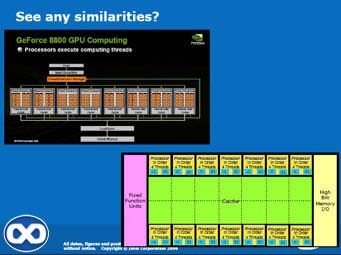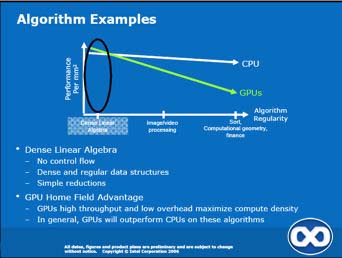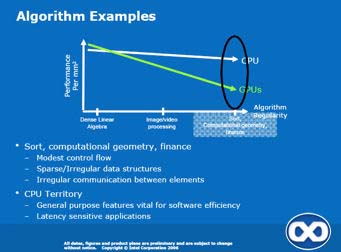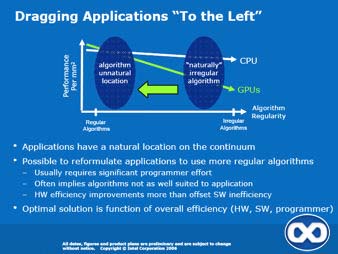Well now, not really much to add to that. . ."Ride to the sound of the guns, boys!"
Just in case we've forgotten already who the enemy is, and why. . .
Now here's where things really get interesting. Intel provides their vision of where the fault lines and relative advantages for CPU vs GPU are by application types. It is particularly interesting to note that they place video processing firmly in the CPU camp, and yet all current premium video solutions for high-end codecs rely on GPU power to accelerate this function smoothly. Of course, part of that is dedicated silicon for the decoding, but many of the video quality enhancements on G80 are done in the shader core, presumably through CUDA!
It should be noted there that one of the points Intel brings forward is that GPUs are weak at "communciation between elements". That has been traditionally true, but it is certainly also one of the things that CUDA's Parallel Data Cache, aka Shared Memory, is trying to fix. NVIDIA's goal there definiely was to increase their addressable market. It won't fix the problem completely. GPUs are still awful at *creating* complex data structures, for example, among many other things. But it's a step in the right direction, and it highlights that NVIDIA and AMD are ready to change how their GPUs work to get all those GPGPU dollars, just like Intel is ready to change how its CPUs work to try and make sure that doesn't happen. Finance is another area where Intel might be underestimating GPU vendors, but then again, that probably depends on how you define Finance...
There's also a fairly strong implication in these slides that there could be a serious struggle for the hearts and minds of ISVs brewing dead ahead, and their willingness (or not) to be convinced to "drag applications to the left" could be a major factor in how events play out. Certainly the GPU boys and their devrel teams are very familiar with that kind of battleground. Interestingly, one of our ninjas reports having gotten a few of Intel's acolytes on the side and perceived a nearly staggering lack of appreciation from them for just how important and resource-intensive the software development infrastructure and support side can be. One hopes for their sake that the senior people have a finer appreciation for this element. But when one remembers how many games updated for dual core CPUs last year also included a note that Intel's HT technology (introduced in 2002!) received significant benefits too. . . well, let's say that confidence on that point is hard to come by.


